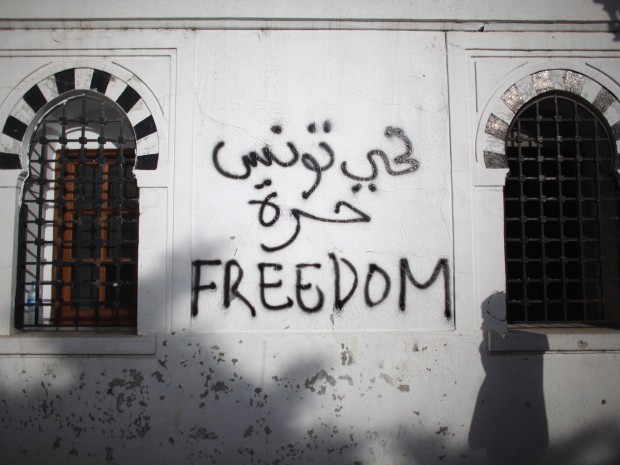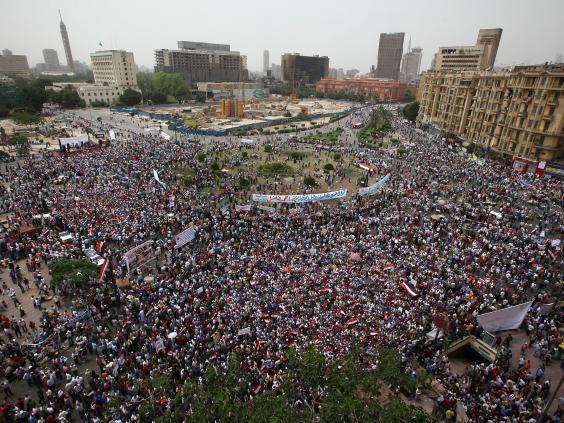The Arab Spring began in hope, but ended in desolation
Independent
Five years ago, waves of popular protest began to spread, thrillingly, across the Arab world. Is anyone better off as a result? Patrick Cockburn reflects

Arab Spring was always a misleading phrase, suggesting that what we were seeing was a peaceful transition from authoritarianism to democracy similar to that from communism in Eastern Europe. The misnomer implied an over-simplified view of the political ingredients that produced the protests and uprisings of 2011 and over-optimistic expectations about their outcome.
Five years later it is clear that the result of the uprisings has been calamitous, leading to wars or increased repression in all but one of the six countries where the Arab Spring principally took place. Syria, Libya and Yemen are being torn apart by civil wars that show no sign of ending. In Egypt and Bahrain autocracy is far greater and civil liberties far less than they were prior to 2011. Only in Tunisia, which started off the surge towards radical change, do people have greater rights than they did before.
What went so disastrously wrong? Some failed because the other side was too strong, as in Bahrain where demands for democratic rights by the Shia majority were crushed by the Sunni monarchy. Saudi Arabia sent in troops and Western protests at the repression were feeble. This was in sharp contrast to vocal Western denunciations of Bashar al-Assad’s brutal suppression of the uprising by the Sunni Arab majority in Syria. The Syrian war had social, political and sectarian roots but it was the sectarian element that predominated.
Why did intolerant and extreme Islam trump secular democracy? It did so because nationalism and socialism were discredited as the slogans of the old regimes, often military regimes that had transmuted into police states controlled by a single ruling family. Islamic movements were the main channel for dissent and opposition to the status quo, but they had little idea how to replace it. This became evident in Egypt where the protesters never succeeded in taking over the state and the Muslim Brotherhood found that winning elections did not bring real power.

The protest movements at the beginning of 2011 presented themselves as progressive in terms of political and civil liberty and this belief was genuine. But there had been a real change in the balance of power in the Arab world over the previous 30 years with Saudi Arabia and the Gulf monarchies taking over leadership from secular nationalist states. It was one of the paradoxes of the Arab Spring that rebels supposedly seeking to end dictatorship in Syria and Libya were supported by absolute monarchies from the Gulf.
The West played a role in supporting uprisings against leaders they wanted to see displaced such as Muammar Gaddafi and Assad. But they gave extraordinarily little thought to what would replace these regimes. They did not see that the civil war in Syria was bound to destabilise Iraq and lead to a resumption of the Sunni-Shia war there.
An even grosser miscalculation was not to see that the armed opposition in Syria and Iraq was becoming dominated by extreme jihadis. Washington and its allies long claimed that there was a moderate non-sectarian armed opposition in Syria though this was largely mythical. In areas where Isis and non-Isis rebels ruled they were as brutal as the government in Damascus. The non-sectarian opposition fled abroad, fell silent or was killed and it was the most militarised and fanatical Islamic movements that flourished in conditions of permanent violence.
Country-by-country
- MOROCCO
Concessions by King Mohammed VI, including a referendum in July 2011 that led to changes in the constitution, helped ensure that protests fizzled out by end of 2012.
- ALGERIA
Barely affected after an initial year-long state of emergency; some terrorist activity, including 2013 gas plant attack in which dozens of foreign hostages were killed.
- TUNISIA
The birthplace of the Arab Spring is also its one success story. There were free elections in 2011 and 2013, and the country is largely peaceful – although up to 300 people died in the unrest that overthrew President Ben Ali in 2011. Terrorist attacks in 2015 have cast a shadow, and threaten to cause a disastrous fall in tourism.
- LIBYA
Hopes raised by Nato-aided overthrow of Colonel Muammar Gaddafi in August 2011 were bitterly disappointed. An elected parliament, the General National Congress, took power in August 2012 but was forced to withdraw to Tobruk as a rival government seized Tripoli. Much of the country is now under control of neither, with Isis established in some parts.
- EGYPT
Up to 900 people were killed in protests that led to fall of President Hosni Mubarak in 2011. His successor, Mohamed Morsi of the Muslim Brotherhood, was ousted by the army in July 2013. Nearly 1,000 people were killed in the protests that followed. A new President, General Abdel Fattah el-Sisi, was elected in 2014; hundreds of Muslim Brotherhood members have since been sentenced to death.
- LEBANON
The country has taken in more than a million Syrian refugees as a result of the Spring. Also at risk of violence spilling over from Syria. Sectarian violence in some cities, notably Tripoli.
- JORDAN
Moderate protests led to modest reforms, and a few changes of government, by King Abdullah II. The main effect of the Spring has been the arrival of a least 600,000 Syrian refugees (and a similar number of Syrians who are not classified as refugees).
- SYRIA
A few weeks of hope in 2011. Since then, endless catastrophe, defined as a civil war by the UN since mid-2012. Up to 350,000 people have died, 4.4 million are refugees, swathes of the country are controlled by Isis, moderate rebels have been massacred, the Assad regime remains (partly) in place, and intervention by foreign powers – including Russia, Iran, the US, France and the UK – has not slowed the slaughter.
- IRAQ
Minor protests in 2011 and major ones in 2012-13, aimed at corruption and anti-Shia discrimination. The electoral defeat of Nouri al-Maliki as Prime Minister in 2014 came too late to disperse the resentment; by then, Isis was running amok. Despite recent gains by the Iraqi army, large regions are under Isis control.
- SAUDI ARABIA
Kept a lid on domestic discontent through a mix of authoritarianism and state largesse. Helped crush protest in Bahrain. Military intervention in Yemen has been bloody and inconclusive. Plummeting oil prices and a change of monarch have destabilised the regime.
- KUWAIT
Protests in 2011-12 fizzled out after fall of one government. The Al-Sabah family continues to rule.
- BAHRAIN
Around 30 people died when protests against the ruling Khalifa family were suppressed, with Saudi help, in early 2011. Thousands have since been jailed in the crackdown by the Sunni regime on its majority Shia population.
- QATAR
Largely unaffected by domestic protests, but involved in upheavals elsewhere, notably by joining the Nato-led campaign that overthrew Colonel Gaddafi in Libya.
- UAE
Calls for greater democracy fizzled out. Remains stable and, for now, prosperous.
- OMAN
Protests in 2011 led to the creation of a Public Authority for Consumer Protection.
- YEMEN
President Ali Abdullah Saleh was forced out of the country and office in, respectively, 2011 and 2012. An uprising by Shia rebels led by Abdul-Malik al-Houthi, which began in 2014, led to the flight of Saleh’s successor, Abd Rabbuh Mansur Hadi, in 2015. The Iran-aligned Houthis now control the capital but are under attack from a Saudi-led Sunni coalition.
Timeline
2011
14 Jan: after several weeks of protests in Tunisia, President Ben Ali resigns.
25 Jan-25 Feb: protests in Egypt and Lebanon (25 Jan); Yemen (3 Feb); Bahrain and Jordan (14th); Libya (15th); Morocco and Iraq (20th); Algeria (22nd); Jordan (25th.)
11 Feb: Hosni Mubarak resigns as President of Egypt.
6 Mar: unrest in Deraa, Syria.
14-15 Mar: Bahrain unrest crushed with Saudi help.
19 Mar: Nato intervenes to support Libyan rebels.
3 June: President Ali Abdullah Saleh flees Yemen.
July: Syrian defectors form the Free Syrian Army.
20-22 Aug: Libyan rebels take Tripoli.
20 Oct: Muammar Gaddafi killed in Sirte.
23 Oct: Islamist Ennahda party wins elections in Tunisia.
2012
27 Feb: Abd Rabbo Mansour Hadi elected Yemen’s President.
24-30 Jun: Mohamed Morsi is elected President of Egypt.
7 July: elections in Libya.
11 Sep: Islamists attack US diplomatic compound, Benghazi.
2013
9 May: Isis formed.
3 July: Morsi ousted as Egypt’s elected President.
21 Aug: chemical attack in Damascus; US and UK vow “serious response”.
29 Aug: Commons votes against anti-Assad action.
2014
4 Jan: Isis takes Fallujah, Iraq.
14 Jan: Isis takes Raqqa, Syria.
28 May: Abdel Fattah al-Sisi elected Egypt’s President.
29 Jun: Isis declares “caliphate”.
8 Aug: US-led coalition starts air strikes against Isis in Iraq.
19 Aug: Isis beheads its first Western hostage, James Foley.
22 Sep: US-led coalition starts air strikes against Isis in Syria.
21 Dec: Beji Caid Essebsi wins Tunisia’s presidential election.
2015
7 Jan: Charlie Hebdo terror attacks in France; 12 die.
26 Jan: Saudi-led air strikes on Yemen’s Houthi rebels.
1 Apr: Isis takes Palmyra.
26 Jun: 38 killed in beach attack in Sousse, Tunisia.
14 July: Iranian nuclear deal.
21 Oct: Russian airliner brought down in Sinai; 224 killed.
30 Sep: Russia starts strikes against Syrian rebels.
12 Nov: Mohammed Emwazi (“Jihadi John”) killed.
13 Nov: Paris terror attacks.
20 Nov: UN backs anti-Isis action; UK follows suit (2 Dec).
28 Dec: Iraq retakes Ramadi.
2016
3 Jan: Saudi Arabia executes 47 alleged “terrorists”.
6 Jan: images of starving people emerge from Madaya, Syria.
How to submit an Op-Ed: Libyan Express accepts opinion articles on a wide range of topics. Submissions may be sent to oped@libyanexpress.com. Please include ‘Op-Ed’ in the subject line.
- Libya’s HCS invites applicants for key state roles - December 31, 2023
- UK calls on Iran to prevent escalation in Israel-Hamas conflict - November 05, 2023
- Libyan Interior Minister: Immigrant shelter costs a fortune - November 05, 2023


